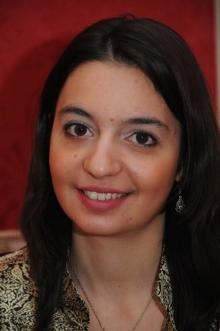Giulia Peri

Last update: before 2019
Giulia Pero has graduated with full marks and honours in Latin Literature at the Normal Superior School of Pisa. She published an essay on the narrative style of Satyricon.
She studied violin and choral singing at the Music School of Fiesole, where she played with the Orchestra Galilei in occasion of the courses of Carlo M. Giuliani. At a very young age, she performed a white voice solo following the directions of Zubin Mehta, Myung-Whun Chung, Daniel Oren for the Maggio Musicale Fiorentino. In addition to the violin, she has graduated with honors in vocal chamber music and in choir direction. As a student of Stephen Woodbury and Leonardo De Lisi, she has sung as solo in internationally relevant concerts, including the festival of Ravenna, , Koiné–I Pomeriggi musicali (Milano), Tage alter Musik (Regensburg), Cité de la Musique (Parigi), Robeco Zomerconcerten–Concertgebouw (Amsterdam), Festival internazionale di Santander, European Christmas Festival (Riga), Festival dei due Mondi di Spoleto, Fabbrica Europa, Amici della musica di Firenze, Unione musicale (Torino), Musikfest Stuttgart, I Concerti del Quirinale.
She works together with a group that performs baroque, renaissance and medieval music and of Gregorian chant (La Venexiana; Accademia Hermans; Il Rossignolo; L’Homme armé; Mediae aetatis sodalicium). She commits passionately to music of the 900s and contemporary music, with a repertory that ranges from Crumb to Ligeti, from Gershwin to Cage and Fedele, working together with ICAMus, TempoReale, FLAMEnsemble. At the Theater dal Verme of Milan she performed for Koiné the first execution of Aphrodite of Ruggero Laganà. In 2004 she was also involved in the production of the opera of Mauro Montalbetti Il sogno di una cosa, composed in memory of the forty years from the slaughter of Piazza della Loggia. In memory of Primo Levi she organized a programs with a series of Hebrew authors, performing a duo with the pianist Gregorio Nardi and that offer a vast panorama of the Hebrew musical culture from the nineteenth century up to masterpieces composed during Nazism.








